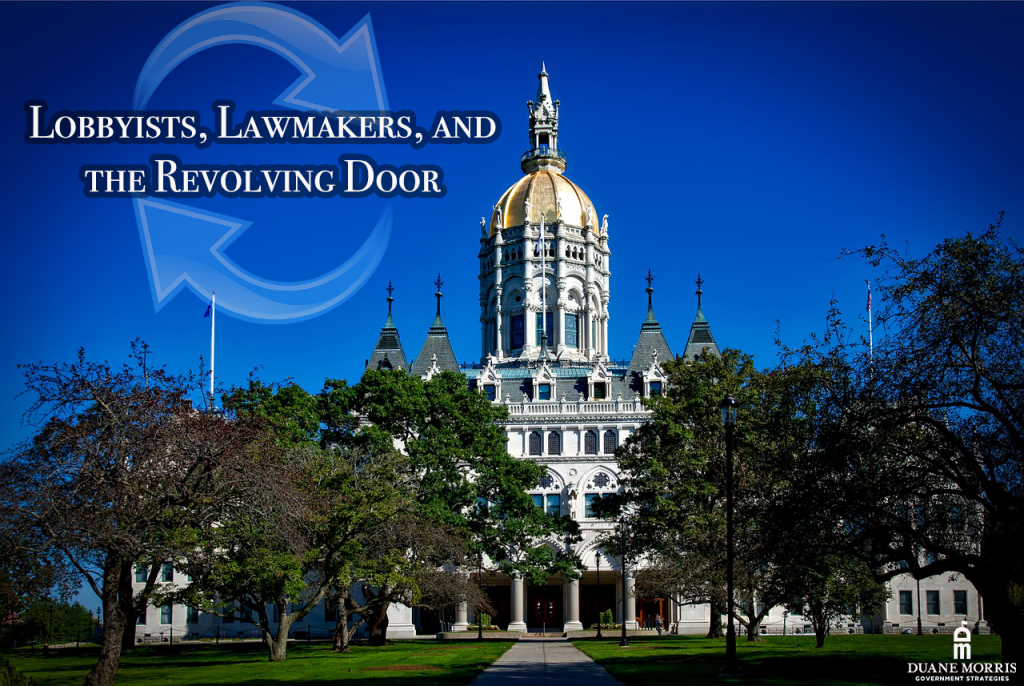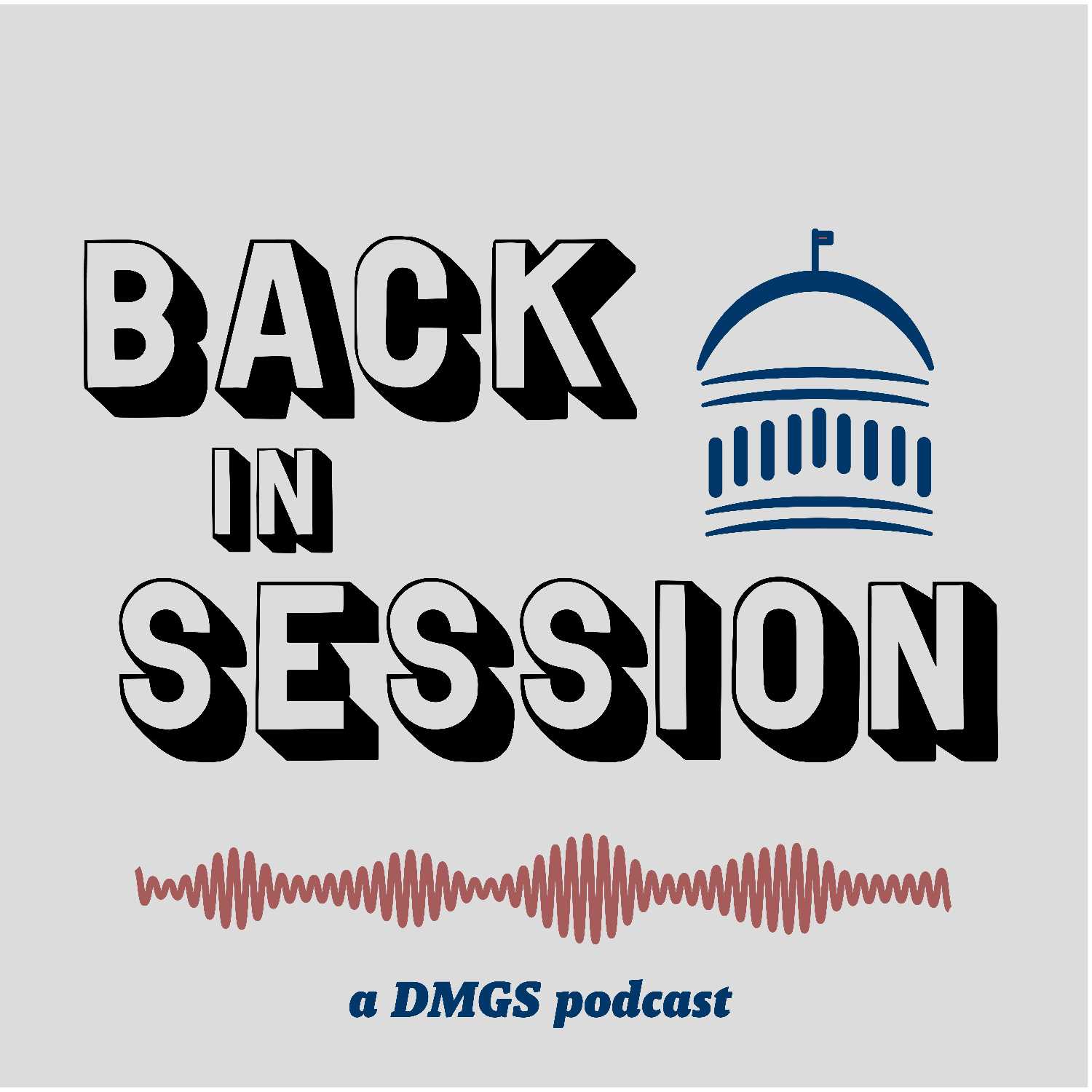
A “revolving door” is the practice of public officials or employees leaving their positions to lobby. However, each state has rules and laws that stipulate when public officials or employees can begin lobbying. The period that someone must wait is a “cooling off” or “waiting” period. Each state has its own rules, and some lawmakers are actively looking to make changes to the length of the cooling-off periods.
Connecticut
Connecticut’s current revolving door prohibitions stipulate that state representatives and senators shall not become lobbyists until one year after the expiration of the term for which they were elected.
In the most recent legislative session, SB 364 would have required certain agencies to submit a list of designated positions subject to the revolving-door provisions to the Office of State Ethics annually rather than being designated in regulations. The bill did not advance past the committee process.
In 2019, HB 6300 was introduced but did not pass. The bill would have addressed the revolving door between the legislative and judicial branches of state government. It would have prohibited the Judicial Selection Commission from adding a former member of the General Assembly to the list of names that the Governor may consider when nominating an individual to become a judge unless three years have passed since the former member last served in the General Assembly.
In 2017, SB 483 would have expanded the revolving door restrictions prohibiting certain legislative and executive branch employees from lobbying. Such employees include those whose positions involving significant decision making or supervisory responsibility.
Florida
Florida’s current lobbying requirements stipulate that no member of the legislature or statewide elected officer shall personally represent another person or entity for compensation before the government body or agency of which they were an officer or member for two years following vacation of office. For two years, a former lawmaker may not lobby for compensation before an executive branch agency, agency official, or employee.
However, Florida is set to have the most prolonged cooling-off period in the country at six years following a November 2018 constitutional amendment that passed via ballot initiative. This new cooling-off period will go into effect on December 31, 2022.
Florida lawmakers further passed HB 7009 (its companion bill in the Senate was SB 7006) in February of this year. Governor Ron DeSantis signed it into law in September. The measure puts penalties behind the new ethics rules voters approved two years ago.
Nevada
Nevada’s current lobbying requirements state that for one year, former public officers or employees of a board, commission, etc., shall not solicit or accept employment from a business or industry whose activities are governed by regulations adopted by the board, commission, etc.
Nevada’s revolving door, or cooling-off, requirements came from Assembly Bill 273 in 2015. The bill prohibited a former legislator from receiving compensation to lobby before the Legislature, beginning when they leave office and ending at the next regular session’s adjournment. An exception was carved out if lobbying is a duty of the former legislator’s full-time employment and the former legislator does not act as a lobbyist for any other employer, client, or client of their employer.
New Jersey
Current New Jersey lobbying requirements state no person shall register as a governmental affairs agent within one year of the office or employment termination.
In February 2020, Governor Phil Murphy targeted lobbying reform in his legislative package of state government ethics reforms. Included in Murphy’s legislative package was a bill extending the state’s cooling-off period, which applies to the Governor, Cabinet, and legislators, from one to two years. The bill further targeted all executive and legislative branch staff earning more than $100,000 per year.
North Carolina
The current North Carolina revolving door prohibitions state no former legislator may register as a lobbyist for six months after leaving office.
Lawmakers in both the state Senate and state House introduced legislation in the most recent legislative session to extend the current revolving door prohibition. Senate Bill 641 and House Bill 574 would have changed the law so no legislator or former legislator may register as a lobbyist for two years after leaving office. Under the bill, the same two-year period would apply to current and former public servants and state agency employees. State agency employees would not be able to lobby the state agency for which they previously worked.
Pennsylvania
Current Pennsylvania lobbying requirements stipulate that former public officials and employees may not lobby on any matter before the governmental body that they had been associated with for one year after leaving that body.
Keystone State lawmakers introduced numerous bills in the most recent legislative session to address lobbying reform and the revolving door. None of these bills introduced in the 2019-20 legislative session advanced through the committee process.
House Bill 2263 proposed instituting a lifetime lobbying ban for all public officials while extending public employees’ waiting period from one year to two years. This bill’s sponsor, Representative Melissa Shusterman, sent out a cosponsor memo to reintroduce the bill in the 2021-22 legislative session.
House Bill 2940 would have allowed former members of the Pennsylvania General Assembly to continue lobbying activities after leaving office. However, members elected after this legislation is enacted would not receive their pension or health benefits for any calendar year in which they lobby before the General Assembly.
Senate Bill 528 would have barred public officials from accepting an appointment to any governmental body for one year after leaving the General Assembly.
Wisconsin
Wisconsin’s current lobbying requirements state that no former state public official may, for compensation, on behalf of another who is not a governmental agency, make an appearance before or negotiate with any officer or employee of the department with which they were associated for 12 months following the date they end service.
Some lawmakers in the most recent legislative session hoped to extend these requirements to prohibit lobbying in general for a certain period. Assembly Bill 984 and Senate Bill 858 were both introduced and would have prohibited any individual who serves as a member of the legislature from being employed as a lobbyist for 12 months following the date on which they ceased to hold office.
Other Lobbying Articles
Check out more lobbying articles, including lobbying guides and tips here.
Latest News
As legislative sessions kick off across the country, advocacy professionals must navigate diverse political landscapes, shifting priorities, and fast-moving policy developments. In this episode of Back in Session, hosts Ryan Stevens and Ryan DeMara sit [...]
Photo credit: iStock.com/hapabapa As the year draws to a close, state legislatures across the country are gearing up for their upcoming sessions in 2025. A critical aspect of this preparation is state legislative prefiling, a [...]
In this episode of the Back in Session podcast, hosts Ryan Stevens and Ryan DeMara sit down with Terra McClelland, President of the State Government Affairs Council (SGAC) and Vice President of Government and External [...]
Photo credit: iStock.com/Pavel Muravev Following the 2022 midterm elections, Democrats hold veto-proof majorities in both legislative chambers in nine states, compared to 18 for Republicans. In a state’s checks and balances system, [...]






Stay In Touch